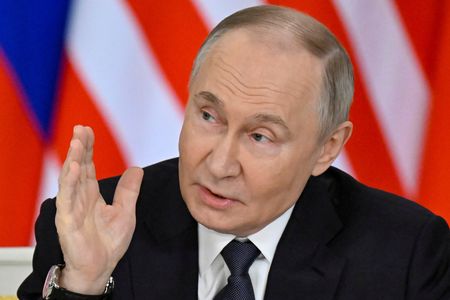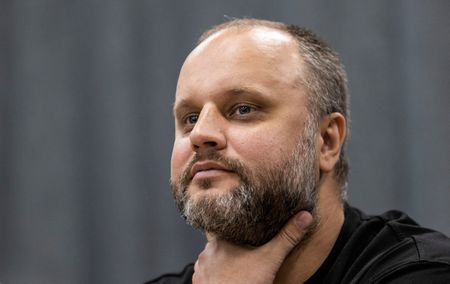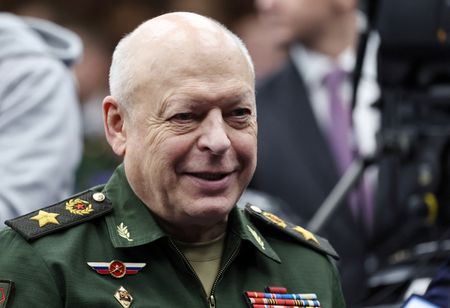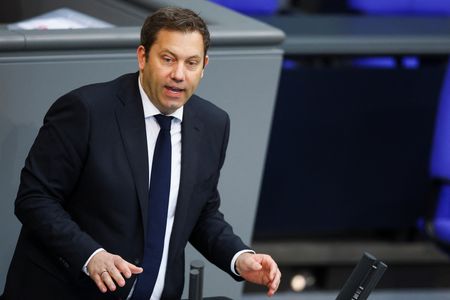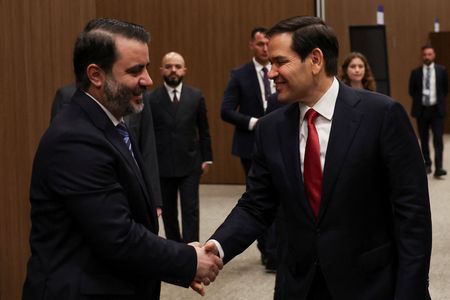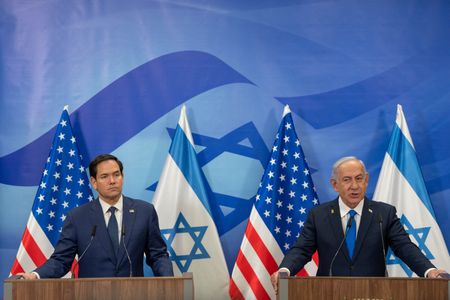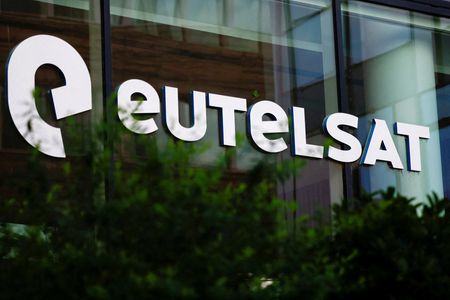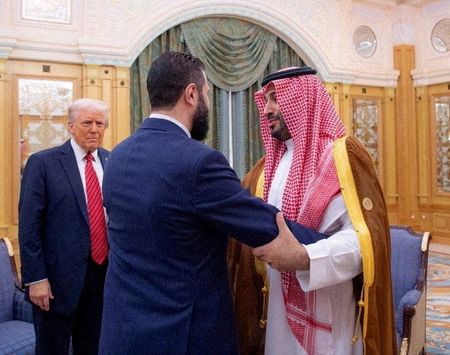By Andrew Osborn
(Reuters) -As Russian President Vladimir Putin explores a potential peace settlement to end the war in Ukraine, hawkish anti-Western nationalists at home are waging a campaign to keep the conflict going.
“We surrender our weapons, we surrender our country!”, Pavel Gubarev, a pro-Moscow activist in part of Ukraine’s eastern Donetsk region controlled by Moscow, posted on Sunday, raging against the prospect of the conflict being “frozen” along current lines.
To someone brought up in the West, it might look at first sight as if Putin is under pressure.
However, the so-called ‘Z-patriots’ – named after a symbol Russian forces in Ukraine paint on their vehicles – must conform to certain rules and do not ultimately pose a threat to Putin, three people close to the Kremlin said. They will be expected to toe the line if and when the moment comes to make peace, the people said.
At the same time, Putin and his intelligence agencies do need to manage Russia’s hardcore nationalists to ensure they don’t disrupt his goals, the three people said.
Analysts say that by arguing for the war to continue, as U.S. President Donald Trump and some Western European leaders push for a deal, the Z-patriots can sometimes go too far for the Kremlin’s liking by riling up the public and creating expectations of a more ambitious battlefield campaign.
“They are not all under full control,” said Tatiana Stanovaya, a senior fellow at the Carnegie Russia Eurasia Center who has studied the Kremlin for years.
Stanovaya, whom the Russian authorities last year designated a “foreign agent,” noted that some Z-patriots have called on the Russian army to take the Ukrainian cities of Kyiv and Odesa and even attack Poland. Such targets go well beyond what Putin, who has claimed four Ukrainian regions as part of Russia – in addition to Crimea – has stated as Russia’s war aims.
“Their whipping up of people and pushing society to support a bigger military campaign is a hindrance and work goes on to get them to tone down what they are saying or put a sock in it because they stir up society when Putin needs to hold talks,” said Stanovaya.
The Kremlin did not immediately respond to a request for comment for this story.
Some of the Z-patriots – war bloggers or war correspondents – have half a million followers or more on the Telegram social media platform and are widely read inside Russia, including among the elite, abroad, and in Ukraine.
But they must tread carefully.
Nationalists who have crossed the Kremlin in the past ran into problems – notably rebellious Wagner mercenary group leader Yevgeny Prigozhin and outspoken ultra-nationalist Igor Girkin. Prigozhin died in a plane crash and Girkin was jailed.
The Kremlin has rejected as an “absolute lie” the suggestion that Putin had Prigozhin killed in revenge for his mutiny. It says it does not interfere in court cases, something critics contest.
Analysts say the Z-patriots have been useful to the Kremlin, helping it build and maintain broad public support for the war for the last three years.
But Z-patriots who make too much of a fuss about any eventual peace deal risk being purged, said the three sources, who, like others in this story, spoke on condition of anonymity given the matter’s sensitivity.
One of the sources said the ultra-nationalists would quickly change their rhetoric once the Kremlin settles on a peace plan.
“It will be like a light switch is being flicked,” the source said.
‘WAR WILL CONTINUE’
After Putin called for direct peace talks in Istanbul with Ukraine at a Kremlin news conference on Sunday, some ultra-nationalists were quick to voice their concerns.
A Russian negotiating team was in Turkey on Thursday for the talks, though it was unclear if they would happen, with Putin himself apparently not attending.
“Our war will continue until the complete liberation of Novorossiya and Malorossiya,” Konstantin Malofeyev, a nationalist tycoon who is married to a senior government official reporting directly to Putin, wrote in his blog on Monday, using terms that hark back to the Russian Empire and describe a swath of modern-day Ukraine once ruled by the Tsars.
Malofeyev did not respond to a request for an interview.
Meanwhile Dmitry Medvedev, a former Russian president who is currently deputy chairman of the Security Council and who once styled himself as a liberal pro-Western moderniser, took to X on Saturday to say a truce would offer the Ukrainian army “respite”.
Medvedev has garnered a reputation for making often extreme and undiplomatic remarks, but his utterances do reflect a strand of thinking among senior Kremlin figures, five diplomats consulted by Reuters said. As a former Kremlin chief, analysts and one of the sources said Medvedev – who remains close to Putin – enjoyed particular licence to speak out.
One of the sources said that bellicose pronouncements by nationalists like Malofeyev – though sincere and not scripted – are one way of tracking whether the Kremlin is really close to peace in Ukraine or not.
If and when the war ends or is close to ending and the situation changes, such people will sense that the wind has changed, the source said. Those that don’t adjust their behaviour could find themselves in jail, said another of the sources.
The authorities have made two rules very obvious: don’t criticise Putin personally or the army’s top brass.
Under a law passed soon after tens of thousands of Russian troops swept into Ukraine in 2022, “discrediting” the military was made punishable by up to 15 years in jail.
After accusing Putin and the army top brass of failure in Ukraine, Girkin, a former FSB officer and battlefield commander wanted for a war crime in the West, was convicted of inciting extremism in 2024 and handed a four-year jail term.
Nonetheless, he wrote on social media from prison on Monday that “only a fool or a saboteur who secretly assists the enemy in the information sphere could talk about the imminent end of the war and any compromise.”
Yevgeny Prigozhin, founder of the Wagner mercenary group, took his men on an abortive and bloody march on Moscow in June 23 to try to oust the then defence minister and strayed into personal criticism of Putin.
He was killed in a plane crash with his top lieutenants two months to the day after his mutiny. Putin later intimated that the plane had been blown up with hand grenades while those on board were high on cocaine and alcohol.
‘THE PARTY OF WAR’
Many Russians associate the Z-Patriots label with war bloggers and correspondents, a group that rose to prominence after the start of the conflict.
Outspoken in the war’s early stages, the Kremlin and the Defence Ministry later invited many of them to briefings to try to co-opt them. Some now re-publish Defence Ministry press releases along with their own analysis; others remain more outspoken.
But the so-called “party of war” includes a wider group of voices too, including deputies of the State Duma, the lower house of parliament, and so-called “political technologists” experts who shape public opinion on primetime state TV chat shows dedicated to the war, providing a useful service to the Kremlin by repeating and amplifying its preferred storyline.
War hawks include figures linked to the Defence Ministry, intelligence agencies, law enforcement agencies and individuals who have been or remain close to Putin.
Those allowed to appear on the TV chat shows about the war regularly bandy about wild threats against the West, such as using nuclear weapons against Britain or invading the Baltic countries.
A fourth source inside Russia said the desire to prolong the war in some circles was driven by a domestic pressure inside the system on Putin to definitively settle what they see as Russia’s Ukraine problem.
Carnegie’s Stanovaya, who, based on polling, estimated the Z-patriots’ views are shared by 10-15% of Russians, said Putin’s own firmly-held ideas meant the nationalists were not a serious influence on him.
“Without radical external changes, Putin is committed to ending the war on his own terms,” she said referring to his stated territorial and security goals in Ukraine. “He’s ready to wage war for years or to achieve his aims in a different way.”
(Reporting by Andrew OsbornAdditional reporting by Guy Faulconbridge and Darya Korsunskaya Editing by Frank Jack Daniel)

